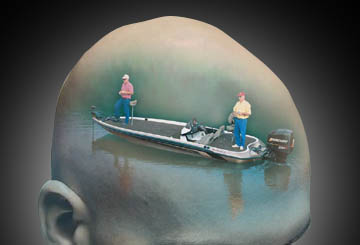New season, new goals, new plans

Welcome to 2010 and a fresh tournament season! Without a doubt, this is one of the most exciting and emotionally charged times for competitive anglers. Last year’s triumphs are fondly remembered, while the mistakes and poor showings of 2009 are mentally whittled away and forgotten. A few “coulda, woulda, shoulda” thoughts remain, though mostly we are filled with positive anticipation, enthusiasm and hope. This year we’re gonna “git R done!” At least in our imagination, we’ve figured out where the lunkers live and how we’re going to make them bite.
Hold on to that enthusiasm! It’s a great foundation on which to build practical skills as well as psychological techniques that will help you on your journey to fishing success.
Still, you don’t want to stop at the intersection of Great Expectations and Hope. To get where you want to go, you need wheels, man – a jazzed-up, fully loaded turbo outfit that will smoke the competition! And whether it’s competitive fishing, NASCAR or life, your hopped-up turbo outfit must contain smooth-running mechanical/practical parts along with well-oiled psychological components.
OK, I’m a psychologist, and my expertise is on the mental aspects of sport. However, one of the best pieces of performance advice I ever got was practical, and it came from a tennis coach. We were assembled for our first group lesson at the University of Missouri-St. Louis on a bright, tennis-perfect July day. Coach T. walked over with his basket of practice balls, introduced himself and spoke briefly about his coaching philosophy. Then he posed his first question: “Do you hold in your hand a racquet that can win any match you play, one that is capable of doing whatever you ask of it?” Only about half of us said “yes.”
Coach T. continued: “There is no sense taking these or any lessons if you do not have complete confidence in your equipment. If you doubt your racquet, you may improve your technique somewhat, but there will come a time – a crucial serve, volley or groundstroke in a big match – when doubt in your equipment will bring you down. Come to next lesson with a confident racquet.”
As a tournament angler, you also need to start the season with confident equipment. As you go through your tackle this winter, do an honest inventory. Do you keep several rod-and-reel combinations, even though some of them don’t really fit what you want them to do? A 6-foot spinning rod and 10-pound mono can throw a plastic frog into the lily pads, but you won’t bring it back with any fish attached. OK. That might seem too obvious, but just last year I saw three new tournament guys trying to do just that.
The message is this: Be realistic when assessing your equipment. Do you have reels that slip occasionally? Is this a reel you might have in your hands when the tournament is on the line? If you answered yes/yes, then replace, or at least retire, that reel. How much rust on your hooks is too much? Jay Yelas and the other FLW Tour pros would say any rust is unacceptable. Clean or replace your hooks as you choose, but don’t think you can confidently rely on corroded terminal tackle, pal, because you can’t.
Speaking of hooks, it will take some time to check the points on all those crankbait trebles, but you’ll fish a lot more confidently this year knowing every crank you tie on is seriously ready to rock and roll. If you find yourself wondering if this is the DD-22 with the bad front hooks, your attention may be diminished just enough to miss the strike that would have put you in the money. You know you missed bites like that last year; we all did. Eliminating tackle doubt is one way to improve your concentration and, ultimately, your catch ratio.
About every third fishing article printed in the January-February-March issues of fishing magazines emphasizes the importance of goal-setting heading into the new season, and as you know, Dr. Fish rides that bandwagon all the way. Goals work. Period. End of discussion. Check the previous columns in this series to get the basics on goal setting. And remember these key points: 1) Set realistic, attainable goals that are somewhat above last year’s level; 2) Make your goals specific enough to be useful: “doing better than last year” is a wish, “improving four places in the club AOY race “is a goal; 3) Create a loooong list of things you can do to reach your goal, and then do something at least once a week to get closer, because goals don’t just happen by themselves – you make them happen by regularly practicing practical and mental skills; which leads to 4) Make a practice plan for each of your goals and follow them. Successful athletes in every sport spend most of their time implementing practice plans. You need to do the same if you want to get better.
Here is a tip you haven’t heard before: Give yourself feedback in the proper ratio. What the heck does that mean? It means that too much positive feedback can be just as damaging as too much negative feedback. Most everyone knows that if you are too harshly critical of your own performance, you create a negative atmosphere in which it’s difficult to learn. (When someone’s yelling at you, it’s hard to hear the message, right?) However, too much sugar-coated feedback stops you from recognizing and correcting your mistakes. The proper ratio, performance psychology tells us, is four or five positives for each negative. That ratio will keep you realistic yet pumped up!
One final thought: Take advantage of the adage that says the best way to learn something is to teach it to someone else. Pick a skill you know you should improve, like reading lake maps.
Then offer to teach a young angler what you know. Doing this will force you to understand lake-map reading in a more complete way; and if you have a curious student, he/she will ask good questions that will also stretch your brain.
Next month I will write about creating your mental inventory. Until then, clean out the gear that doesn’t quite work, and start the 2010 season with confident equipment!

————————————————–
Jay T. McNamara, Ph.D., L.P., also known as Dr. Fish, recently finished his book “The Psychology of Exceptional Fishing.” You can order it by contacting Jay via e-mail at this address: [email protected].
————————————————–
Jay T. McNamara, Ph.D., L.P., is a psychologist, who is also an avid bass and walleye angler. With more than 27 years of professional experience complemented by participation in competitive fishing at local and national levels, he is uniquely qualified to illustrate how performance psychology principles apply to tournament fishing.